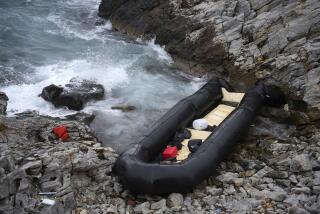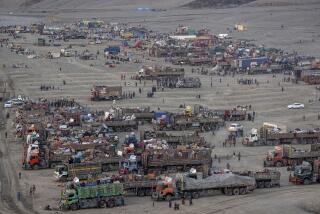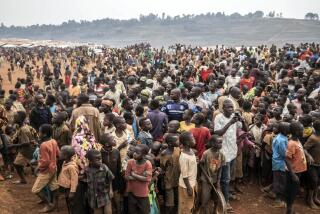Nations Less Welcoming of Refugees, U.N. Says
- Share via
NAIROBI, Kenya — Life has never been more difficult for the 22 million refugees and displaced people protected by the United Nations, according to a report released today that has raised alarm about the growing inhospitality toward asylum seekers.
While some countries cite threats to their internal security and a lack of resources to explain their diminished enthusiasm for hosting refugees, others are simply tired of the responsibility, aid officials say.
“We take it very seriously,” said Dennis McNamara, a senior official with the Office of the U.N. High Commissioner for Refugees. “Many governments that for many years were hospitable are beginning to say enough’s enough, and are sealing borders and pushing people back.”
Said another senior U.N. official: “The expulsion of refugees and asylum seekers is the ultimate crime a government can commit.”
According to the refugee agency’s biennial report, donors’ demands for quick solutions to refugee emergencies and the growing reluctance of poor nations to provide asylum for any great length of time have increased pressure on the U.N. to support repatriation, which is not always voluntary and often forces people back to nations still in the midst of the conflict and instability they fled.
African nations’ behavior toward refugees has been mixed. U.N. officials say many countries in the west and south of the continent have a glowing record of housing and protecting displaced people. In the Great Lakes region, however, relief workers have in recent weeks complained of the systematic violation of basic principles of refugee protection.
Over the past two months, U.N. officials say, the Tanzanian army has rounded up more than 28,000 Congolese, Burundians and Rwandans whom the government has called “illegal residents.”
There have been reports of refugee expulsions from Rwanda and Burundi, and in August the U.N. protested the forcible repatriation from Gabon of eight Rwandan Hutu refugees who the agency said met all the criteria for refugee status and deserved international protection.
Congo, which in October closed part of its eastern border and ordered the U.N. refugee agency to leave the country’s Goma region, recently rounded up about 2,000 Rwandans and Burundians--and some Congolese--and expelled them to Rwanda and Burundi. Among them were people who had lived in Congo (formerly Zaire) for decades, as well as refugees from the 1994 ethnic warfare in Rwanda that resulted in the massacre of at least 800,000 Tutsis and moderate Hutus.
That conflict, which sent about 1.75 million Rwandans into neighboring countries, is at the root of much of the hostility toward refugees, U.N. and relief officials say.
“The influx of Rwandan refugees into then-Zaire and Tanzania posed an enormous challenge to the whole international system of protection of refugees and to the principles of asylum,” said Pierce Gerety, director of the U.N. refugee operation for the Great Lakes region. Many of those responsible for the genocide were among the droves of refugees, he noted.
Fear that militia groups posing as refugees would disrupt security within their adopted countries, or use relief camps to launch incursions into their homelands, contributed to the decision of some countries to oust Rwandan Hutu refugees, relief workers explain.
In addition, the sudden influx of thousands of displaced people can drain the resources of a poor nation: Refugees occupy land that would normally be used for farming; they chop down trees for firewood and shelter; and they often pollute rivers and streams in the vicinity of their camps.
McNamara, of the U.N. refugee agency, said most African nations have signed the Organization of African Unity Refugee Convention, which commits them to hosting refugees.
“All we are saying is meet, please, your treaty obligations,” McNamara said. “It’s not asking a lot.”
U.N. officials stress that lack of respect for refugee rights is a problem not only in Africa. The 5 million people who requested asylum in Western Europe, North America and Australasia in the past decade have faced “measures intended to prevent or deter people from seeking refuge,” the report says.
At the U.N. last month, High Commissioner for Refugees Sadako Ogata asked: “If affluent countries do not set positive examples in respecting refugee rights, how can we ask developing countries, beset by very serious economic problems, to continue to apply open and generous refugee policies?”
More to Read
Sign up for Essential California
The most important California stories and recommendations in your inbox every morning.
You may occasionally receive promotional content from the Los Angeles Times.











